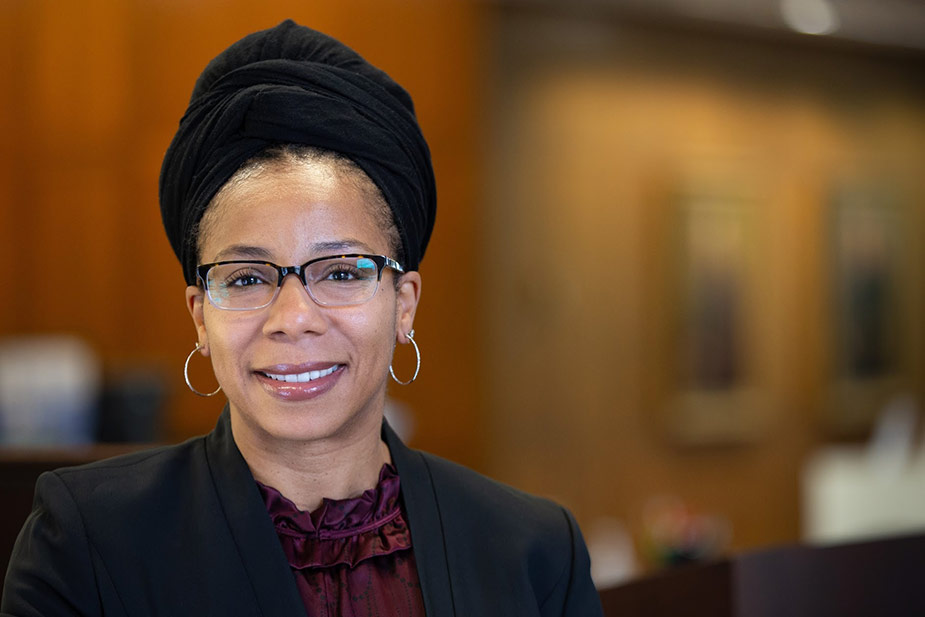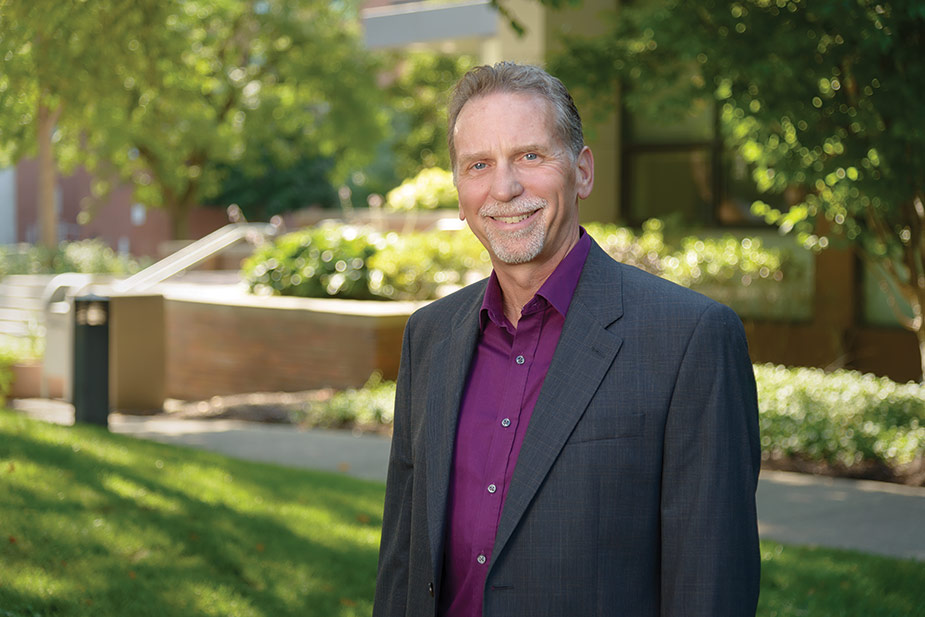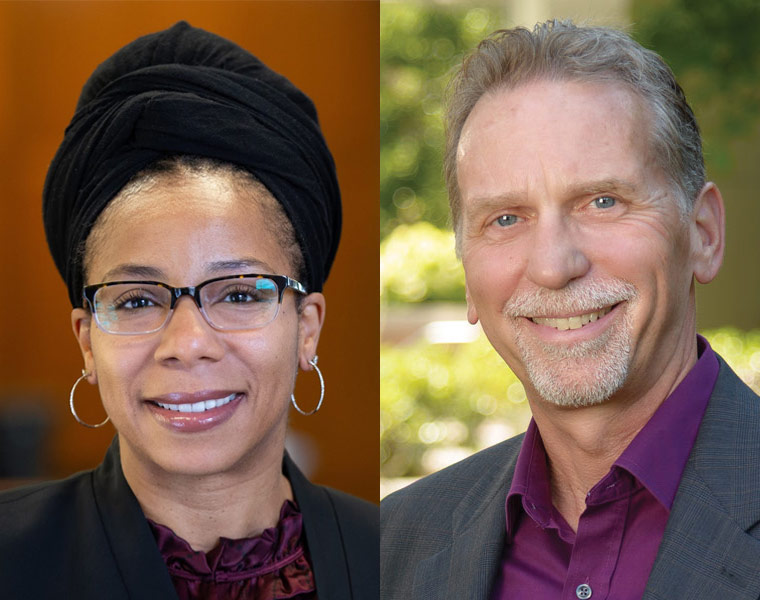Words have meaning—but when it comes to addressing systemic racism and creating an inclusive, equitable society, the work must go beyond statements and translate into action. For Ayesha Bell Hardaway and Mark Chupp, co-directors of Case Western Reserve University’s Social Justice Institute (SJI) since May 2020, that goal is at the heart of everything they do.

After the murder of George Floyd sparked national protests and a resurgence in calls for racial justice last summer, Bell Hardaway and Chupp quickly met the moment, developing a campus call to action and playing a significant role in the university’s first Day of Dialogue—setting the stage for their leadership.
In under a year, they also navigated the institute through a pandemic, hosted a 10-year anniversary celebration, maintained engagement virtually across the university and throughout the community, and offered academic opportunities such as the SJI minor program and various graduate student/faculty fellowships.
A Complementary Pair
When seeking leadership for the SJI, the university could think of no better pair than Bell Hardaway and Chupp. Bell Hardaway,assistant professor at the School of Law and director of the Social Justice Law Center, and Chupp, assistant professor at the Jack, Joseph and Morton Mandel School of Applied Social Sciences, both boast impressive credentials and are involved in the community through research, scholarship and personal volunteerism. Chupp also serves as the chair of the Concentration in Community Practice for Social Change Network and founding director of the Community Innovation Network.

While their expertise and perspectives differ, they share a passion for social justice and deep respect for the SJI.
“I spent a lot of time in spaces where [social justice] wasn’t valued or understood,” said Bell Hardaway. “As a young professor on campus, [the] SJI provided a sense of home and community for me that was hard to find anywhere else. It was at a time when people were mostly thinking about a post-racial America rather than recognizing and identifying the fact that the racial hierarchy and structures for subordination really are still strong at work in our country.”
“Our country is seeing the impact of generations of injustices and disparities, and the increasing polarization has only made that worse,” echoed Chupp. “This was the moment: If not us, who will do this? And if not now, when?”
Driving Change
In their work today, the co-directors address the American reality head on, understanding words matter and actions are integral.
“We have to name white supremacy and the extremism that comes from it, that is manifesting itself in many different forms,” said Chupp. Bell Hardaway reinforced that, while statements have a time and place, we must also do the work.
Housed under the Office of the Provost, the SJI brings together members of the university and surrounding community to devise multifaceted solutions to complex issues, partnering with schools and interdisciplinary centers to amplify their work and voices. Aligning with the Think Big Strategic Plan, the SJI is advancing commitments to social justice and racial equity to transform the university into a more inclusive, welcoming and equitable place.
“There is so much work to be done,” said Bell Hardaway. “What 2020, and now 2021, are showing us is that it is going to take a strong collective effort across multiple organizations, levels of government and levels of community in order to really make marked change. No one center or institute can do that.”
The SJI’s immediate goals include ensuring police services on campus align with community standards in a way that makes everyone feel safe and welcome; conducting research designed to understand disparities within the criminal legal system on a local, state and national level; intentionally partnering with others, locally and nationally, who are committed to working toward the liberation of the marginalized and oppressed; and working with university development experts to ensure the institute’s sustained presence on campus and access to critical resources.
The co-directors are also planning to reimagine and establish the institute’s leadership team, including student, faculty, staff and community representation, in order to expand the institute’s presence and provide guidance and accountability.
Learn more about Bell Hardaway and Chupp in this week’s five questions.
1. What is something cool you’ve learned at CWRU this year?
Bell Hardaway: The Black Student Union hosted an event during Black History Month where they invited students, staff and faculty. A group of us got together and told stories about our ancestors that you wouldn’t find in books or in newspapers. It was such a good time of community building and also uplifting and acknowledging the love and dedication of those who came before us. It was a really great way to get to know our undergraduate students.
Chupp: I’ve learned you can actually build community and have highly interactive spaces virtually. With the Community Innovation Network, we did a two-day training and it was amazing how fast the time went. We do all kinds of fun stuff to try to simulate being together in a room and interacting with one another.
2. Do you prefer to get work done early in the morning or late at night?
Bell Hardaway: The work is always here! My strongest moments of uninterrupted time to think are early in the morning. I don’t like it, but for whatever reason it’s when my brain is fresh.
Chupp: I like early mornings for meditating and getting myself centered. But, I often wrote my dissertation after the kids went to bed, between 8:30 p.m. and midnight or 1 a.m. If I have a really important project, especially writing, it ends up being late at night.
3. What do you consider the greatest invention?
Bell Hardaway: Delicious gluten-free, dairy-free desserts.
Chupp: The bicycle. It has not changed since it was invented, except making it a bit more efficient. It is one of the most efficient machines on the planet. It continues to produce health, it is carbon neutral and it reduces road congestion. It continues to be, in the light of sustainability, an amazing invention but also great just for peace of mind.
4. Outside of school and work, what is your favorite way to spend time?
Bell Hardaway: This may be cliche, but it’s true: Spending time with my family. My kids are in college, or out of college about to go to graduate school, so they’re not home all the time. Even when they were here all the time, it was my favorite thing to do. I still very much enjoy talking, texting and FaceTiming with them, and having them come home and eat everything.
Chupp: I am married and have two adult children, and my favorite thing is to go hiking in nature with them, staying in a cabin, cooking and eating together, and talking. We did that in January in Hocking Hills.
5. What’s your favorite thing about Case Western Reserve?
Bell Hardaway: Having the space to explore the research and engage in the scholarship that is extremely important to me personally and professionally. Having the freedom to do that and feeling as if it is unencumbered in any way.
Chupp: The first thing that came to me was the commitment of the university to excellence and scholarship. The freedom that the university gives for me to explore what’s important to me and the ability to do that with wonderful colleagues who share common values.

